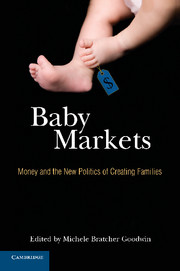Book contents
- Frontmatter
- Contents
- Preface
- Acknowledgments
- Introduction
- PART ONE WHAT MAKES A MARKET? EFFICIENCY, ACCOUNTABILITY, AND RELIABILITY OR GETTING THE BABIES WE WANT
- PART TWO SPACE AND PLACE: REPRODUCING AND REFRAMING SOCIAL NORMS OF RACE, CLASS, GENDER, AND OTHERNESS
- PART THREE SPECTRUMS AND DISCOURSES: RIGHTS, REGULATIONS, AND CHOICE
- PART FOUR THE ETHICS OF BABY AND EMBRYO MARKETS
- 15 Egg Donation for Research and Reproduction: The Compensation Conundrum
- 16 Eggs, Nests, and Stem Cells
- 17 Where Stem Cell Research Meets Abortion Politics: Limits on Buying and Selling Human Oocytes
- PART FIVE TENUOUS GROUNDS AND BABY TABOOS
- Author Bios
- Index
- References
15 - Egg Donation for Research and Reproduction: The Compensation Conundrum
Published online by Cambridge University Press: 05 August 2012
- Frontmatter
- Contents
- Preface
- Acknowledgments
- Introduction
- PART ONE WHAT MAKES A MARKET? EFFICIENCY, ACCOUNTABILITY, AND RELIABILITY OR GETTING THE BABIES WE WANT
- PART TWO SPACE AND PLACE: REPRODUCING AND REFRAMING SOCIAL NORMS OF RACE, CLASS, GENDER, AND OTHERNESS
- PART THREE SPECTRUMS AND DISCOURSES: RIGHTS, REGULATIONS, AND CHOICE
- PART FOUR THE ETHICS OF BABY AND EMBRYO MARKETS
- 15 Egg Donation for Research and Reproduction: The Compensation Conundrum
- 16 Eggs, Nests, and Stem Cells
- 17 Where Stem Cell Research Meets Abortion Politics: Limits on Buying and Selling Human Oocytes
- PART FIVE TENUOUS GROUNDS AND BABY TABOOS
- Author Bios
- Index
- References
Summary
Nobel Prize winner George Bernard Shaw was quite prophetic when he wrote, “Science … never solves a problem without creating ten more.” The development of assisted reproductive technologies (ARTs) and the subsequent emergence of embryonic stem cell therapy (EST) have illustrated the multitude of questions raised by technological advancement.
This chapter will focus on the dilemmas raised by payment for oocytes extracted from one woman either to assist another individual or couple build their family through ART or to assist researchers in pursuit of the promises of EST. Section A will provide a brief overview of egg donation. Section B will provide a brief overview of EST and how donated oocytes may become integral in stem cell research. Section C will examine the issue of payment to or compensation of donors of oocytes in both the reproductive and the research contexts and why the issue of payment for the same physical act seems so divisive depending on the ultimate purpose for which the oocytes will be used. Finally, the chapter will conclude with a discussion of autonomy and paternalism and the need to reconcile these positions to ensure that the benefits and ART and EST are both maximized and the harms are minimized to women and society overall.
- Type
- Chapter
- Information
- Baby MarketsMoney and the New Politics of Creating Families, pp. 226 - 236Publisher: Cambridge University PressPrint publication year: 2010
References
- 1
- Cited by



